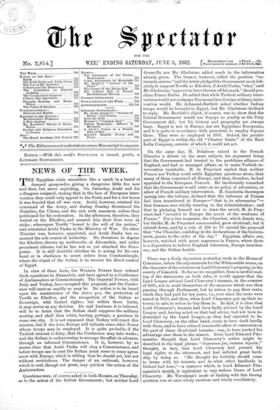There was a lively discussion yesterday week in the House
of Commons, before the adjournment for the Whitsuntide recess, on the character of the evictions on Lord Cloncnrry's property, in the county of Limerick. So far as we can gather, from a careful read- ing of the statements on both sides, it would appear that the Land League advised Lord Cloncurry's tenants, in the summer of 1881, not to avail themselves of the measure which was then passing through Parliament, but to refuse to pay their rents, which they had paid for ten years, i.e., ever since the rents were raised in 1870, and then, when Lord Cloncurry put up their in- terests to sale, to refuse to buy them in. In fact, it is clear that Lord Cloncnrry's tenants had been badly advised by the Land League, and, having acted on that bad advice, had not been in- demnified by the Land League, as they had expected to be. Lord Cloncurry, on the other hand, seems to have dealt hardly with them, and to have refused reasonable offers of concession on the part of these ill-advised tenants,—nay, to have pushed his advantage over them to the utmost. Even Lord Edmund Fitz- maurice thought that Lord Cloncurry's action might be described in the legal phrase, " Summum jus, summa inj aria ;" thought, in fact, that Lord Cloncurry had pressed his legal rights to the uttermost, and had inflicted great hard- ship by doing so. "He thought his lordship should come to terms with his tenants, and do what other landlords in Ireland had done,"—a sentence which, in Lord Edmund Fitz- maurice's mouth, is equivalent to very serious blame of Lord Cloncurry. Mr. Trevelyan's mode of dealing with this thorny question was at once wisely cautious and wisely conciliatory.














































